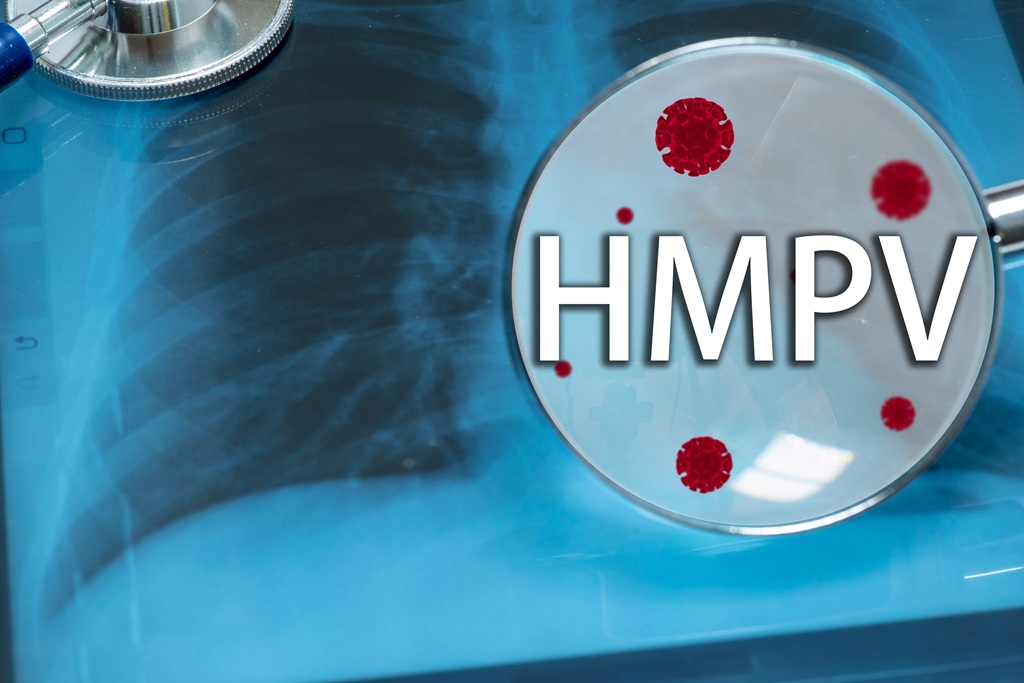Human Metapneumovirus (HMPV) is a common respiratory infection affecting people of all ages. Its symptoms range from mild cold-like issues to severe respiratory distress. While there is no specific cure, supportive care and good hygiene are key to managing HMPV. An HMPV infection is generally self-limiting, but severe cases, especially in infants, the elderly, or those with underlying health conditions, may require medical attention.

Human Metapneumovirus is a respiratory virus first identified in 2001. It belongs to the Pneumoviridae family and shares similarities with the Respiratory Syncytial Virus (RSV). HMPV is most prevalent during winter and spring, contributing to respiratory illnesses worldwide.
HMPV can affect people of all ages but poses the greatest risk to infants, the elderly, and individuals with weakened immune systems. HMPV in adults typically results in mild symptoms but can escalate to severe bacterial lung infections or complications like pneumonia in vulnerable groups.
HMPV symptoms vary in severity and can mimic other respiratory conditions. Common symptoms include:
Cold-like symptoms
HMPV often begins with typical cold symptoms, such as a runny nose, nasal congestion, and a sore throat, making it easy to mistake for a common cold or mild respiratory infection.
Cough
A persistent cough, which is often dry but can occasionally produce mucus, is another hallmark of HMPV. This symptom may linger even after other symptoms subside.
Fever
A mild to moderate fever is a common sign of the body fighting off the virus, often accompanied by a general sense of discomfort.
Wheezing
Wheezing, characterised by a whistling sound during breathing, is more prevalent in children and individuals with asthma or other respiratory conditions.
Shortness of breath
Severe cases of HMPV can lead to noticeable difficulty in breathing, especially in those with compromised lung health.
Fatigue
Generalised tiredness and weakness are common, even after adequate rest, due to the body’s efforts to fight the infection.
Severe cases
In infants, older adults, or immunocompromised individuals, symptoms can escalate to breathing difficulties, bluish skin (cyanosis), and dangerously low oxygen levels, often requiring immediate medical attention.
HMPV spreads through respiratory droplets from coughing, sneezing, or contact with contaminated surfaces. Once inhaled, the virus infects the respiratory tract, causing inflammation and triggering the symptoms.
Factors that increase the risk of contracting HMPV include:
Currently, there is no specific antiviral HMPV treatment. Care focuses on alleviating symptoms and preventing complications. Common approaches include:
Stay Home When Sick: Prevents spreading the infection to others in schools, workplaces, or crowded places.
A HMPV case reported on the news on 6th January 2025 stated that an eight-month-old baby in Bengaluru was diagnosed with the virus. Authorities, including the Health Ministry, have assured the public that there is no cause for panic. The situation is being closely monitored, with enhanced testing and surveillance to detect any potential outbreaks.
Hospitals in India, including Bengaluru, report no unusual surge in respiratory illness cases. Preparedness measures are in place, ensuring the healthcare system can handle any potential rise in respiratory infections.
Seek immediate medical care if you or a loved one experiences:
You can consult with an experienced pulmonologist in Bangalore at your nearest SPARSH Hospital for expert guidance and comprehensive care.
For comprehensive healthcare and expert treatment, the Best General Medicine Hospital in Bangalore offers top-notch services. Whether you’re dealing with a minor illness or a complex condition, their experienced doctors ensure you receive the best care possible. Prioritize your health and seek out the right medical attention for a better and healthier tomorrow. Your well-being is their priority.
For residents of Bangalore, SPARSH Hospitals, a trusted healthcare provider, offers specialised care from expert pulmonologists to manage respiratory infections effectively.
HMPV often begins with cold-like symptoms such as a runny nose, congestion, and cough, accompanied by mild fever. In more severe cases, it can cause wheezing, shortness of breath, and even respiratory distress, particularly in vulnerable groups like infants, older adults, or those with pre-existing conditions.
For most people, HMPV symptoms resolve within a week to 10 days. However, those with weakened immune systems or severe cases may take longer to recover, sometimes requiring medical support to manage complications.
There is no direct cure for HMPV, as it is a viral infection. Treatment focuses on alleviating symptoms, supporting the immune system, and addressing any complications that arise, such as bacterial infections or respiratory distress.
HMPV treatment typically involves rest and staying hydrated to aid recovery. Over-the-counter medications may help reduce fever and ease congestion. Severe cases might require supplemental oxygen or hospital care, especially if breathing difficulties or complications arise.
Categories: General Medicine
Human Metapneumovirus (HMPV): Symptoms & Treatment is available for appointments. Please fill the below form to book an appointment.
|
> General Surgeon in Davanagere |
> General Surgeon in RR Nagar |
|
> General Surgeon in Hassan |
|
Unlock the door to exceptional healthcare, book an appointment with SPARSH Hospital and let your journey to wellness begin.